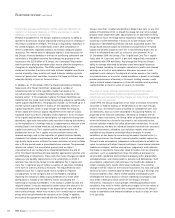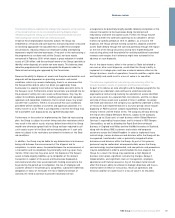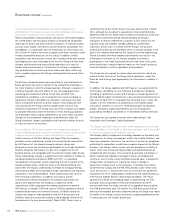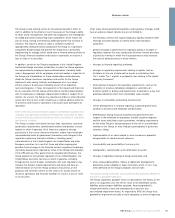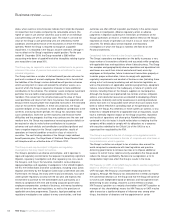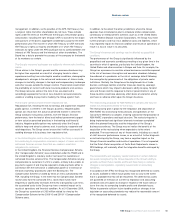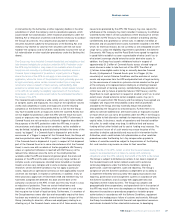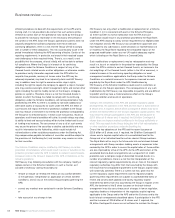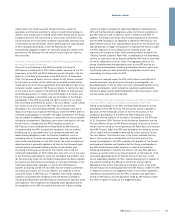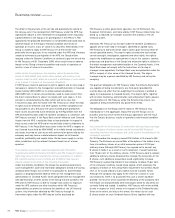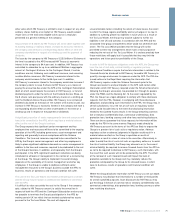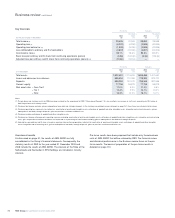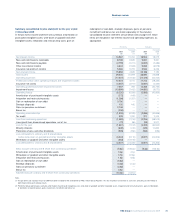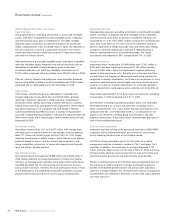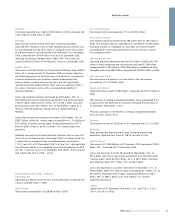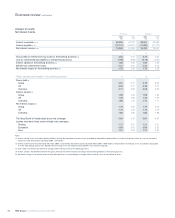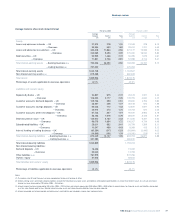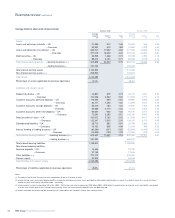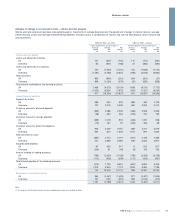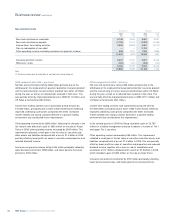RBS 2009 Annual Report Download - page 72
Download and view the complete annual report
Please find page 72 of the 2009 RBS annual report below. You can navigate through the pages in the report by either clicking on the pages listed below, or by using the keyword search tool below to find specific information within the annual report.RBS Group Annual Report and Accounts 200970
Business review continued
The effect of the payment of the exit fee and potentially the refund of
the net pay-outs it has received from HM T
reasury under the APS may
significantly reduce or even eliminate the anticipated further regulatory
capital benefits to the Group of its participation in the APS or if FSA
approval for the proposed termination is not obtained and could have an
adverse impact on the Group’s financial condition and results of
operation or result in a loss of value in its securities. Alternatively, if the
Group is unable to repay to HM Treasury in full the exit fee and
potentially the net pay-outs it has received under the APS and, therefore,
unable to terminate its participation in the APS, the Group will be
required under the Scheme Conditions to continue to pay the annual fee
to HM Treasury until 31 December 2099, which could have an adverse
impact on the Group’s financial condition and results of operation or
result in a loss of value in its securities.
Under certain circumstances, the company cannot be assured that
assets of ABN AMRO (and certain other entities) will continue to be
covered under the APS, either as a result of a withdrawal of such assets
or as a result of a breach of the relevant obligations.
If HM Treasury seeks to exercise its right to appoint one or more step-in
managers in relation to the management and administration of Covered
Assets held by ABN AMRO or its wholly owned subsidiaries,
ABN AMRO will, in certain circumstances, need to seek consent from
the Dutch Central Bank to allow it to comply with such step-in. If this
consent is not obtained by the date (which will fall no less than
10 business days after the notice from HM Treasury) on which the step-
in rights must be effective, and other options to effect compliance are
not possible (at all or because the costs involved prove prohibitive),
those assets would need to be withdrawn by the Royal Bank from the
APS where permissible under the Scheme Conditions or, otherwise, with
HM Treasury consent. If the Royal Bank cannot withdraw such Covered
Assets from the APS, it would be likely to lose protection in respect of
these assets under the APS and/or may be liable under its indemnity to
HM Treasury. If the Royal Bank loses cover under the APS in respect of
any Covered Asset held by ABN AMRO or its wholly owned subsidiaries,
any losses incurred on such asset will continue to be borne fully by the
company and may have a material adverse impact on its financial
condition, profitability and capital ratios. Similar issues apply in certain
other jurisdictions but the relevant Covered Assets are of a lower
quantum.
The extensive governance, asset management and information
requirements under the Scheme Conditions and HM Treasury’s step-in
rights may serve to limit materially the Group’s operations. In addition,
the market’s reaction to such controls and limitations may have an
adverse impact on the price of the company’s securities.
Under the Scheme Conditions, the Group has extensive governance,
asset management, audit and information obligations aimed at ensuring
(amongst other things) that (i) there is no prejudice to, discrimination
against, or disproportionate adverse effect on the management and
administration of Covered Assets when compared with the management
and administration of other assets of the Group that are outside of the
APS and (ii) HM Treasury is able to manage and assess its exposure
under the APS, perform any other functions within HM Treasury’s
responsibilities or protect or enhance the stability of the UK financial
system. Any information obtained by HM Treasury through its
information rights under the APS may be further disclosed by
HM Treasury to other government agencies, the UK Parliament, the
European Commission, and more widely if HM Treasury determines that
doing so is required, for example, to protect the stability of the UK
financial system.
Moreover, HM Treasury has the right under the Scheme Conditions to
appoint one or more step-in managers (identified or agreed to by
HM Treasury) to exercise certain step-in rights upon the occurrence of
certain specified events. The step-in rights are extensive and include
certain oversight, investigation, approval and other rights, the right to
require the modification or replacement of any of the systems, controls,
processes and practices of the Group and extensive rights in relation to
the direct management and administration of the Covered Assets. If the
Royal Bank does not comply with the instructions of the step-in
manager, once appointed, the Royal Bank may lose protection under the
APS in respect of all or some of the Covered Assets. The step-in
manager may be a person identified by HM Treasury and not by the
company.
The payment obligations of HM Treasury under the Scheme Documents
are capable of being transferred to any third party (provided the
transfer does not affect the risk weightings the company is entitled to
apply to its exposures to Covered Assets). The step-in rights, together
with all other monitoring, administration and enforcement rights, powers
and discretions of HM Treasury under the Scheme Documents, are
capable of being transferred to any government entity.
The obligations of the Group and the rights of HM Treasury may,
individually or in the aggregate, impact the way the Group runs its
business and may serve to limit the Group’s operations with the result
that the Group’s business, results of operations and financial condition
will suffer.
Any conversion of the B shares, in combination with any future purchase
by HM Treasury of ordinary shares, would increase HM Treasury’s
ownership interest in the company, and could result in the delisting of the
company’s securities.
On 22 December the company issued £25.5 billion of B shares to HM
Treasury. The B shares are convertible, at the option of the holder at any
time, into ordinary shares at an initial conversion price of £0.50 per
ordinary share. Although HM Treasury has agreed not to convert any
B shares it holds if, as a result of such conversion, it would hold more
than 75 per cent. of the ordinary shares, if HM Treasury were to acquire
additional ordinary shares otherwise than through the conversion of the
B shares, such additional acquisitions could significantly increase
HM Treasury’s ownership interest in the company to above 75 per cent.
of the company’s ordinary issued share capital, which would put the
company in breach of the Listing Rules requirement that at least 25 per
cent. of its issued ordinary share capital must be in public hands.
Although the company may apply to the UKLA for a waiver in such
circumstances, there is no guarantee that such a waiver would be
granted, the result of which could be the delisting of the company from
the Official List and potentially other exchanges where its securities are
currently listed and traded. In addition, HM Treasury will not be entitled
to vote in respect of the B shares or in respect of the Dividend Access
Share to the extent, but only to the extent, that votes cast on such
B shares and/or on such Dividend Access Share, together with any


